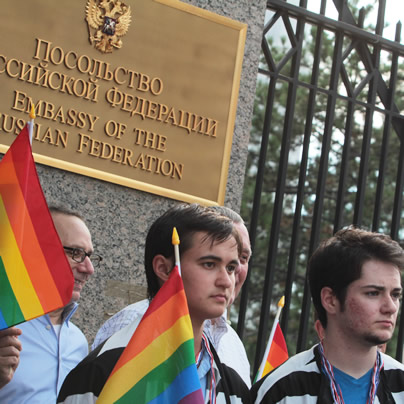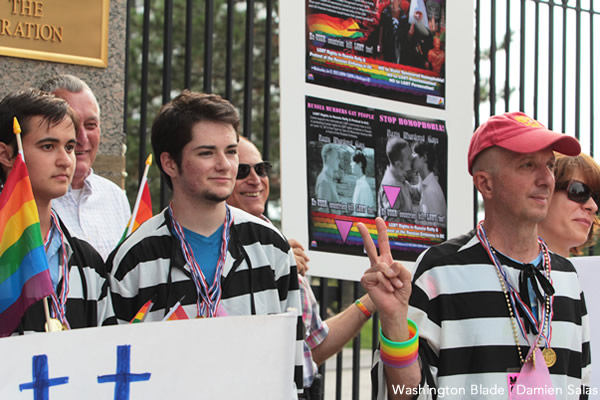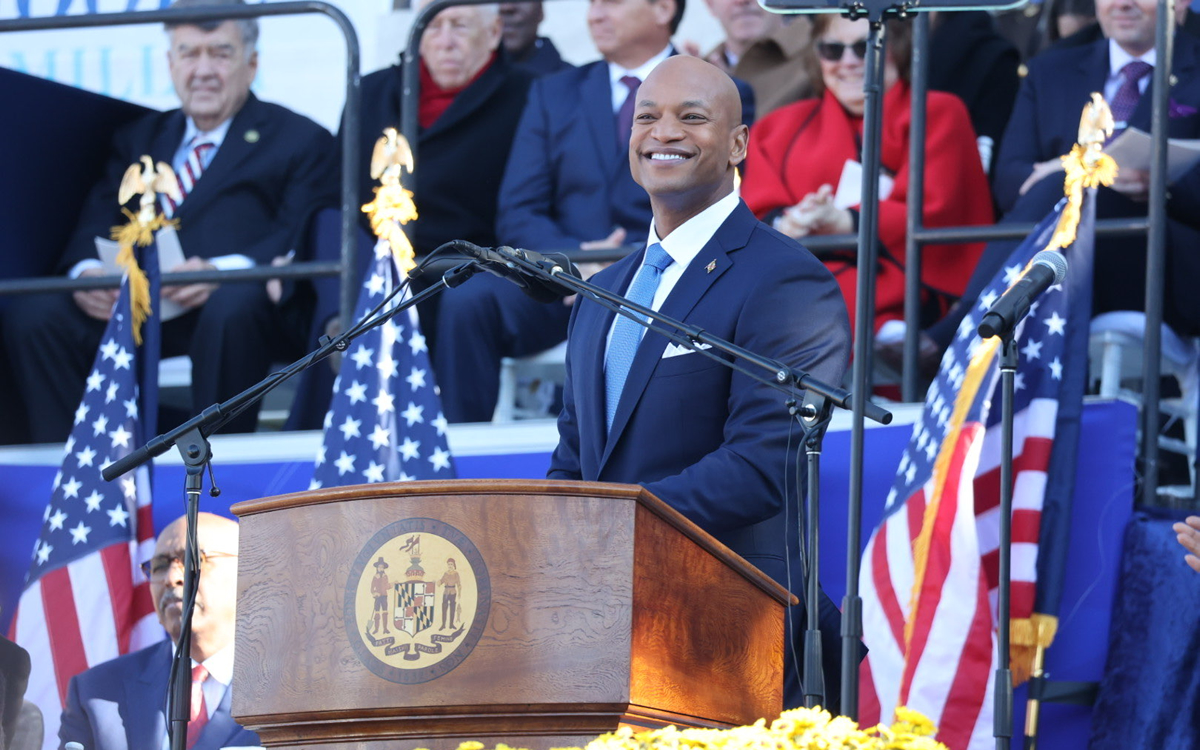News
Russia boycott calls divide LGBT activists
Group protested country’s gay rights record outside Russian embassy in D.C.


Protesters gathered outside of the Russian Embassy on Wednesday, July 31, 2013. (Washington Blade photo by Damien Salas)
LGBT rights advocates remain divided over calls to boycott the 2014 Winter Olympics in Russia and Russian vodka in response to the country’s gay rights record.
Author Dan Savage, LGBT rights advocate Cleve Jones and the group Queer Nation last week launched the “Dump Russian Vodka” campaign that calls for a boycott of Stoli, Russian Standard and other Russian vodka brands. The campaign also urges the U.S. and other countries to boycott the 2014 Winter Olympics that will take place in Sochi, Russia, in February.
“Do not drink Russian vodka,” Savage said in an op-ed in the Stranger, a weekly newspaper in Seattle, published on July 24. “Do not buy Russian vodka. Ask your bartender at your favorite bar — gay or otherwise — to DUMP STOLI and DUMP RUSSIAN VODKA.”
Russian President Vladimir Putin in recent weeks signed a broadly worded law that bans the promotion of so-called gay propaganda to minors and a statute that bans foreign same-sex couples and any couple from a country in which gays and lesbians can legally marry from adopting Russian children. LGBT rights groups are among those that face fines under a law that requires non-governmental organizations that receive funding from outside Russia to register as a “foreign agent.”
About a dozen LGBT rights advocates gathered in front of the Russian embassy in Northwest D.C. to protest the country’s anti-LGBT rights record on Wednesday.
Larry Poltavtsev of Spectrum Human Rights was among those who attended.
“We’re here today to protest LGBT human rights violations in Russia,” he said.
The anti-gay laws have come into effect against the backdrop of increasing anti-LGBT discrimination and violence in Russia.
Two men in the southern Russia city of Volgograd and on the Kamchatka Peninsula in the country’s Far East have been killed in recent months during what local authorities have described as anti-gay attacks.
Police in St. Petersburg on June 29 arrested 40 LGBT activists and a handful of nationalists who confronted them during a gay rights rally. Authorities in the Russian capital in May arrested 30 LGBT rights advocates who tried to stage a Pride celebration outside Moscow City Hall.
Authorities in the city of Murmansk on July 21 took into custody four Dutch LGBT rights advocates who were filming a documentary about gay life in Russia. A St. Petersburg appellate court on July 25 overturned a lower court’s ruling that fined Coming Out, a local LGBT advocacy group, 500,000 rubles or slightly more than $15,202 for violating the “foreign agent” law.
Russian advocate: Boycott will have no effect
Gay bars in Seattle, Chicago, London and other cities have already begun to remove Stoli and other Russian products from their shelves. Gay City News reported a handful of ACT UP members protested a Stoli event at a gay bar in New York City on Tuesday night.
Gay bars in D.C. have thus far not indicated they will participate in the boycott.
Cobalt had been scheduled to host a Stoli-sponsored event for the website GayCities on Thursday, but the company postponed it.
The company did not return the Blade’s request for comment.
Val Mendeleev, CEO of SPI Group, Stoli’s parent company, said in a July 25 statement from Luxembourg the Russian government does not own the brand. He acknowledged the vodka contains Russian ingredients, but it is distilled in a factory in neighboring Latvia.
Mendeleev further pointed out SPI Group has supported a number of pro-LGBT groups and initiatives. These include Pride celebrations in South Africa and Austria and its “Most Original Stoli Guy” partnership with Gaycities.com.
“Stoli firmly opposes such attitude and actions,” Mendeleev said in response to growing concerns over Russia’s gay rights record. “As a company that encourages transparency and fairness, we are upset and angry.”
Nikolai Alekseev of Gay Russia, an LGBT advocacy group, told the Washington Blade from Moscow on Tuesday he feels a boycott of Russian vodka will “not have an effect.”
“The real target of this protest should be the politicians who are behind these initiatives,” he said.
Actor and playwright Harvey Fierstein called for a Sochi boycott in an op-ed the New York Times published on July 21.
Gay Olympic diver Greg Louganis, who was unable to compete in the 1980 Summer Olympics in Moscow because then-President Jimmy Carter boycotted them over the Soviet Union’s invasion of Afghanistan the year before, told Frank Bruni of the New York Times on July 28 that he feels athletes should have the opportunity to compete in Sochi in spite of Russia’s LGBT rights record. Retired tennis champion Martina Navratilova; the LGBT advocacy groups All Out and Athlete Ally and Cyd Zeigler, Jr., co-founder of OutSports, are among those who also oppose a boycott of the Sochi games.
“We want to encourage and support athletics, particularly the Olympics, and feel that a boycott would only hurt the athletes,” Hudson Taylor, executive director of Athlete Ally, told the Blade on Tuesday. “We understand the rationale behind a boycott, but are also cognizant that our call for a boycott could result in negative ramifications and backlash for regional LGBT and ally organizations in Russia.”
State Department spokesperson Jen Psaki on July 26 said the U.S. does not support calls to boycott the Sochi Olympics.
“That’s certainly not what we’re calling for,” she told reporters during her daily briefing in response to the Blade’s question about Russia’s LGBT rights record.
Gay athlete to wear rainbow pin in Sochi
Blake Skjellerup, a gay short track speed skater from New Zealand who plans to compete in Sochi in spite of the calls to boycott the games, last week announced he will wear a gay Pride pin during the Olympics.
He stressed to the Blade his decision is “not about defiance.”
“Wearing a Pride pin is about humanity and unity,” Skjellerup said. “It’s about representing something that is very important to me, and standing up for those who cannot stand up or help themselves.”
The Human Rights Campaign said in a July 24 letter to NBC Universal that the network has “a unique opportunity — and a responsibility — to expose” what it described as the “inhumane and unjust” anti-gay propaganda law during its coverage of the Sochi games. Mark Lazarus, chair of NBC’s sports group, deflected questions about his network’s potential coverage of Russia’s LGBT rights record during a presentation at the Television Critics Association gathering in New York City over the weekend.
The International Olympic Committee has assured gay athletes and others who travel to Sochi that authorities will not arrest them under the Russia’s anti-gay propaganda law. Vitaly Milonov, a St. Petersburg lawmaker behind the city’s gay propaganda to minors ban that took effect in 2012, told the Interfax news agency on Tuesday he has not heard of any plans to suspend the national statute during the games.
“If a law has been approved by the federal legislature and signed by the president, then the government has no right to suspend it,” Milonov said, according to Gay Star News. “It doesn’t have the authority.”
Officials urged to ban Russian lawmakers from U.S.
Alekseev and other Russian LGBT rights advocates have launched a petition on the White House’s website that urges the U.S. to ban Milonov and Elena Mizulina, a Russian Parliamentarian who co-sponsored the national gay propaganda ban, from entering the country. It has received 4,775 signatures as of late on July 30.
“This is the way forward because these people are the real people behind the homophobic legislation,” Alekseev told the Blade.

Maryland Gov. Wes Moore on Thursday signed a bill that seeks to combat efforts to ban books from state libraries.
House Bill 785, also known as the Freedom to Read Act, would establish a state policy “that local school systems operate their school library media programs consistent with certain standards; requiring each local school system to develop a policy and procedures to review objections to materials in a school library media program; prohibiting a county board of education from dismissing, demoting, suspending, disciplining, reassigning, transferring, or otherwise retaliating against certain school library media program personnel for performing their job duties consistent with certain standards.”
Moore on Thursday also signed House Bill 1386, which GLSEN notes will “develop guidelines for an anti-bias training program for school employees.”

The Mexican Senate on Thursday approved a bill that would ban so-called conversion therapy in the country.
Yaaj México, a Mexican LGBTQ rights group, on X noted the measure passed by a 77-4 vote margin with 15 abstentions. The Chamber of Deputies, the lower house of Mexico’s congress, approved the bill last month that, among other things, would subject conversion therapy practitioners to between two and six years in prison and fines.
The Senate on its X account described conversion therapy as “practices that have incentivized the violation of human rights of the LGBTTTIQ+ community.”
“The Senate moved (to) sanction therapies that impede or annul a person’s orientation or gender identity,” it said. “There are aggravating factors when the practices are done to minors, older adults and people with disabilities.”
Mexico City and the states of Oaxaca, Quintana Roo, Jalisco and Sonora are among the Mexican jurisdictions that have banned the discredited practice.
The Senate in 2022 passed a conversion therapy ban bill, but the House of Deputies did not approve it. It is not immediately clear whether President Andrés Manuel López Obrador supports the ban.
Canada, Brazil, Belgium, Germany, France, and New Zealand are among the countries that ban conversion therapy. Virginia, California, and D.C. are among the U.S. jurisdictions that prohibit the practice for minors.
The White House
Four states to ignore new Title IX rules protecting transgender students
Biden administration last Friday released final regulations

BY ERIN REED | Last Friday, the Biden administration released its final Title IX rules, which include protections for LGBTQ students by clarifying that Title IX forbids discrimination based on sexual orientation and gender identity.
The rule change could have a significant impact as it would supersede bathroom bans and other discriminatory policies that have become increasingly common in Republican states within the U.S.
As of Thursday morning, however, officials in at least four states — Oklahoma, Louisiana, Florida, and South Carolina — have directed schools to ignore the regulations, potentially setting up a federal showdown that may ultimately end up in a protracted court battle in the lead-up to the 2024 elections.
Louisiana State Superintendent of Education Cade Brumley was the first to respond, decrying the fact that the new Title IX regulations could block teachers and other students from exercising what has been dubbed by some a “right to bully” transgender students by using their old names and pronouns intentionally.
Asserting that Title IX law does not protect trans and queer students, Brumley states that schools “should not alter policies or procedures at this time.” Critically, several courts have ruled that trans and queer students are protected by Title IX, including the 4th U.S. Circuit Court of Appeals in a recent case in West Virginia.
In South Carolina, Schools Supt. Ellen Weaver wrote in a letter that providing protections for trans and LGBTQ students under Title IX “would rescind 50 years of progress and equality of opportunity by putting girls and women at a disadvantage in the educational arena,” apparently leaving trans kids out of her definition of those who deserve progress and equality of opportunity.
She then directed schools to ignore the new directive while waiting for court challenges. While South Carolina does not have a bathroom ban or statewide “Don’t Say Gay or Trans” law, such bills continue to be proposed in the state.
Responding to the South Carolina letter, Chase Glenn of Alliance For Full Acceptance stated, “While Supt. Weaver may not personally support the rights of LGBTQ+ students, she has the responsibility as the top school leader in our state to ensure that all students have equal rights and protections, and a safe place to learn and be themselves. The flagrant disregard shown for the Title IX rule tells me that our superintendent unfortunately does not have the best interests of all students in mind.”
Florida Education Commissioner Manny Diaz also joined in instructing schools not to implement Title IX regulations. In a letter issued to area schools, Diaz stated that the new Title IX regulations were tantamount to “gaslighting the country into believing that biological sex no longer has any meaning.”
Governor Ron DeSantis approved of the letter and stated that Florida “will not comply.” Florida has notably been the site of some of the most viciously anti-queer and anti-trans legislation in recent history, including a “Don’t Say Gay or Trans” law that was used to force a trans female teacher to go by “Mr.”
State Education Supt. Ryan Walters of Oklahoma was the latest to echo similar sentiments. Walters has recently appointed the right-wing media figure Chaya Raichik of Libs of TikTok to an advisory role “to improve school safety,” and notably, Raichik has posed proudly with papers accusing her of instigating bomb threats with her incendiary posts about LGBTQ people in classrooms.
The Title IX policies have been universally applauded by large LGBTQ rights organizations in the U.S. Lambda Legal, a key figure in fighting anti-LGBTQ legislation nationwide, said that the regulations “clearly cover LGBTQ+ students, as well as survivors and pregnant and parenting students across race and gender identity.” The Human Rights Campaign also praised the rule, stating, “rule will be life-changing for so many LGBTQ+ youth and help ensure LGBTQ+ students can receive the same educational experience as their peers: Going to dances, safely using the restroom, and writing stories that tell the truth about their own lives.”
The rule is slated to go into effect Aug. 1, pending any legal challenges.
****************************************************************************

Erin Reed is a transgender woman (she/her pronouns) and researcher who tracks anti-LGBTQ+ legislation around the world and helps people become better advocates for their queer family, friends, colleagues, and community. Reed also is a social media consultant and public speaker.
******************************************************************************************
The preceding article was first published at Erin In The Morning and is republished with permission.
-

 District of Columbia3 days ago
District of Columbia3 days agoCatching up with the asexuals and aromantics of D.C.
-

 State Department5 days ago
State Department5 days agoState Department releases annual human rights report
-

 South America3 days ago
South America3 days agoArgentina government dismisses transgender public sector employees
-

 Maine4 days ago
Maine4 days agoMaine governor signs transgender, abortion sanctuary bill into law










